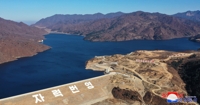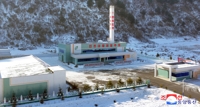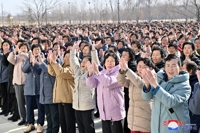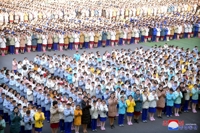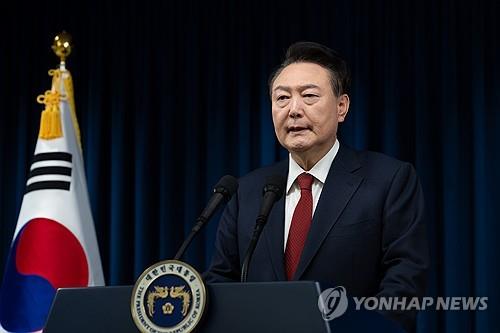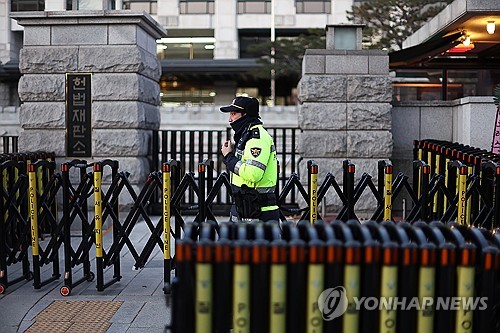(News Focus) N. Korea's explosion of inter-Korean roads epitomizes leader Kim's animosity against S. Korea
By Kim Soo-yeon
SEOUL, Oct. 15 (Yonhap) -- North Korea appears to have blown up the northern side of its roads connected to South Korea as a symbolic measure to erase the legacy of inter-Korean cooperation under its leader Kim Jong-un's "two hostile states" stance, experts said.
North Korea detonated parts of the Gyeongui and Donghae roads north of the inter-Korean border around noon on Tuesday, the South Korean military said, days after North Korea's military vowed to cut off all roads and railways linked to the South and build front-line defense structures.
The move marked the complete disconnection of inter-Korean land routes once seen as symbols of reconciliation and cooperation between the two Koreas. In August, North Korea cut off the Gyeongui and Donghae railways.

This image, captured from footage provided by South Korea's Joint Chiefs of Staff on Oct. 15, 2024, shows North Korea blowing up parts of the Donghae road connected to South Korea earlier in the day. (PHOTO NOT FOR SALE) (Yonhap)
The two Koreas had roads and railways connected to each other -- along the Gyeongui line, which connects the South's western border city of Paju to the North's Kaesong, and the Donghae line along the east coast.
South and North Korea agreed to restore the roads and railways -- long disconnected following the 1950-53 Korean War -- in 2000, when their leaders held the first inter-Korean summit.
The inter-Korean land routes largely remained as symbolic ones as they have long not been used amid frosty relations between the two Koreas.
The use of the Gyeongui road effectively came to a halt after South Korea shut down a joint industrial complex in the North's Kaesong in 2016 over Pyongyang's long-range rocket launch.
South Korea also suspended a joint tour program at North Korea's Mount Kumgang on the east coast in July 2008 after a South Korean woman was killed by a North Korean soldier at the resort.
In 2018, the two Koreas agreed to re-connect and modernize the roads and railways amid a rapprochement atmosphere, and held a ceremony to start the construction. But the operation did not occur as North Korea pushed to advance its nuclear and missile programs following a no-deal summit in Hanoi between then U.S. President Donald Trump and Kim Jong-un in 2019.
At a year-end party meeting, the North's leader defined inter-Korean ties as those between "two states hostile to each other," and said there is no point in seeking reconciliation and unification with South Korea.
Under the Basic Agreement, a key inter-Korean agreement signed in 1991, inter-Korean ties are defined as a "special relationship" tentatively formed in the process of seeking reunification, not as state-to-state relations. This runs counter to Kim's "two hostile states" narrative.
In January, Kim called for revising the constitution to define South Korea as its "invariable principal enemy. He also ordered officials to take steps to "physically and completely" cut off the railway tracks to an "irretrievable level."
Inter-Korean unification had been a long-standing state goal for North Korea since Kim's late grandfather Kim Il-sung founded North Korea, though the North has pursued unification by force.
North Korea held a key parliamentary meeting last week to revise the constitution, but it did not disclose details about whether it erased unification-related clauses or clarified the country's territorial boundaries in line with Kim's order.
Experts said the North Korean regime may have not included Kim's "two hostile states" stance in a revised constitution as it seems to be unable to secure people's full backing of his anti-unification policy.

This image, captured from footage of North Korea's state-run Korean Central Television on Jan. 16, 2024, shows the North's leader Kim Jong-un speaking at a Supreme People's Assembly meeting held the previous day in Pyongyang. (For Use Only in the Republic of Korea. No Redistribution) (Yonhap)
Meanwhile, South Korea's unification ministry "strongly" condemned North Korea's explosion of the inter-Korean roads as a clear violation of an inter-Korean agreement and a "very abnormal" act.
The ministry deplored North Korea's move as the repetition of its "regressive act," citing Pyongyang's 2020 demolition of a joint liaison office in the North's Kaesong.
Last year, the government sued North Korea over 44.7 billion won (US$32.8 million) in damage over North Korea's blowing up of the liaison office. It demolished the office in anger over Seoul's failure to stop North Korean defectors in South Korea from sending anti-Pyongyang leaflets across the border.
The South Korean government may consider suing North Korea over the latest explosion of the land routes as the project to connect the roads and railways involved South Korea's loans worth $133 million.
"North Korea still has an obligation to repay the debt," the ministry said. "All responsibilities related to the explosion of the inter-Korean land routes lie on North Korea.
[email protected]
(END)
-
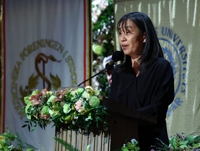 (Yearender) Han Kang's Nobel win marks global recognition of S. Korea's collective trauma, literary healing
(Yearender) Han Kang's Nobel win marks global recognition of S. Korea's collective trauma, literary healing -
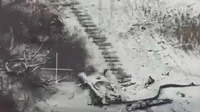 (LEAD) 200 Russian, N. Korean troops allegedly killed in combat against Ukraine: Kyiv
(LEAD) 200 Russian, N. Korean troops allegedly killed in combat against Ukraine: Kyiv -
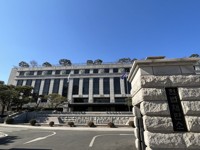 (2nd LD) Constitutional Court to begin Yoon's impeachment trial Dec. 27
(2nd LD) Constitutional Court to begin Yoon's impeachment trial Dec. 27 -
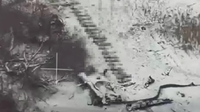 Ukrainian military releases image of N.K. troops allegedly killed in Kursk: report
Ukrainian military releases image of N.K. troops allegedly killed in Kursk: report -
 (URGENT) Prosecution arrests chief of Capital Defense Command
(URGENT) Prosecution arrests chief of Capital Defense Command
-
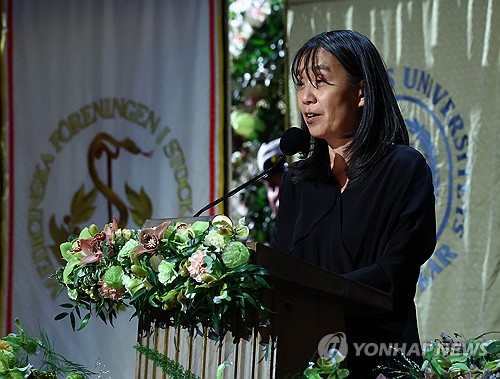 (Yearender) Han Kang's Nobel win marks global recognition of S. Korea's collective trauma, literary healing
(Yearender) Han Kang's Nobel win marks global recognition of S. Korea's collective trauma, literary healing -
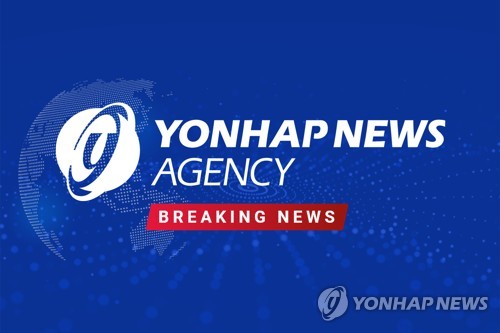 (URGENT) White House says U.S. appreciates resiliency of democracy and rule of law in S. Korea
(URGENT) White House says U.S. appreciates resiliency of democracy and rule of law in S. Korea -
 BLACKPINK's Rose scores British chart success with solo album 'rosie'
BLACKPINK's Rose scores British chart success with solo album 'rosie' -
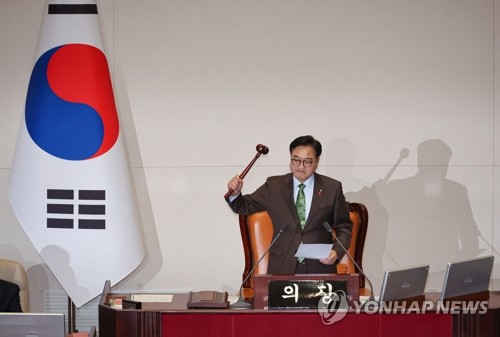 (6th LD) Nat'l Assembly votes to impeach Yoon
(6th LD) Nat'l Assembly votes to impeach Yoon -
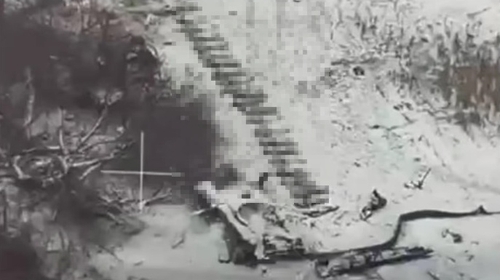 (LEAD) 200 Russian, N. Korean troops allegedly killed in combat against Ukraine: Kyiv
(LEAD) 200 Russian, N. Korean troops allegedly killed in combat against Ukraine: Kyiv
-
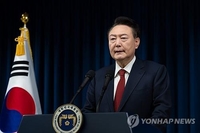 (LEAD) Investigators seek to quiz Yoon over martial law on Christmas Day
(LEAD) Investigators seek to quiz Yoon over martial law on Christmas Day -
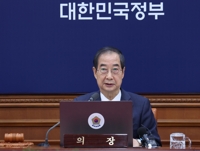 (2nd LD) Acting President Han vetoes six contentious bills passed by opposition
(2nd LD) Acting President Han vetoes six contentious bills passed by opposition -
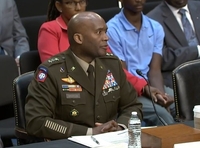 (LEAD) Gen. Brunson to take office as new USFK chief this week: Pentagon
(LEAD) Gen. Brunson to take office as new USFK chief this week: Pentagon -
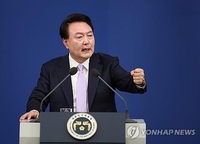 Yoon's legal representative again denies insurrection charges
Yoon's legal representative again denies insurrection charges -
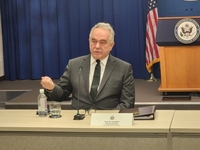 (3rd LD) U.S. plans on high-level in-person engagement with Han's administration during last weeks of Biden gov't: Campbell
(3rd LD) U.S. plans on high-level in-person engagement with Han's administration during last weeks of Biden gov't: Campbell

